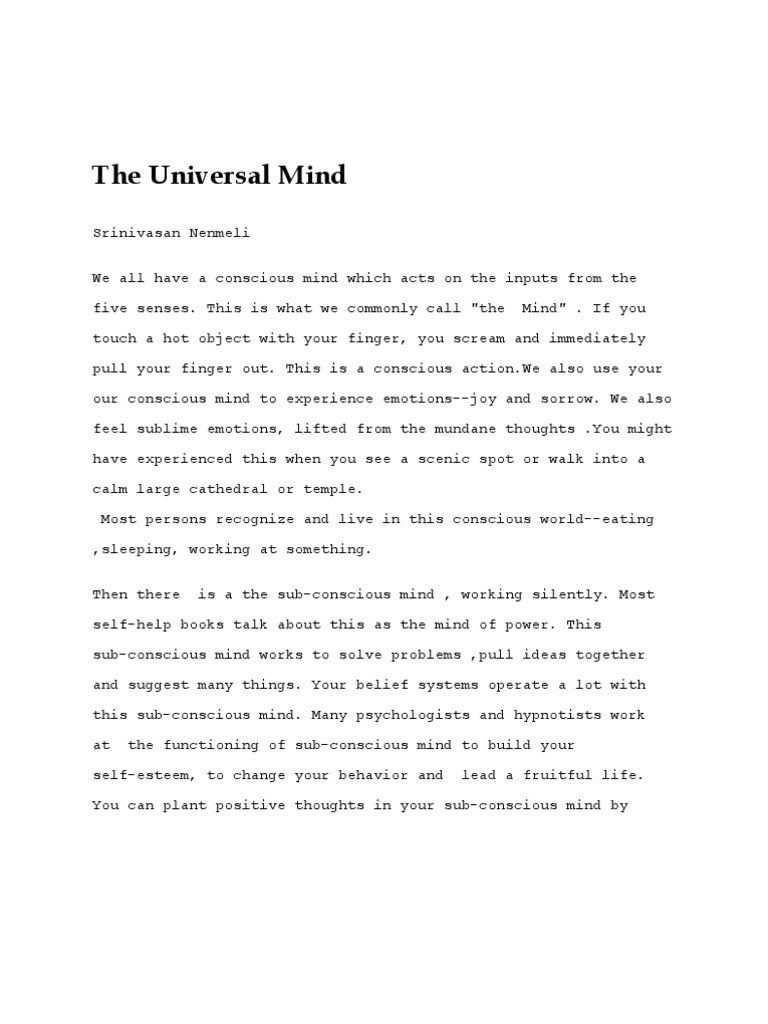In contemplating the profound interconnectedness of all beings, the Bahá’í teachings present a fascinating lens through which to explore the concept of the Universal Mind. This notion posits a creative, all-encompassing intellect that pervades the cosmos, inviting individual souls to partake in the divine. What does it mean to you, as a seeker of truth and understanding, to recognize that you are part of this Universal Mind? This inquiry is both playful and profound, beautifully illustrating how such awareness can simultaneously inform our lives and pose significant challenges.
To illuminate the Bahá’í understanding of the Universal Mind, we must first delve into the fundamental belief in the oneness of humanity. The Universal Mind is not a solitary entity; it embodies the collective consciousness of all humanity, transcending individual perceptions and experiences. Each person’s thoughts, aspirations, and actions are threads woven into a grand tapestry of existence, elaborating the idea that our individual contributions reflect a fraction of this infinite intellect. As you ponder your role within this vast cosmic matrix, how might your conscious choices reflect the attributes of the Universal Mind?
Central to Bahá’í philosophy is the assertion that knowledge is a divine attribute. This principle invites individuals to engage with the world intellectually and spiritually, seeking understanding as a form of service to the Universal Mind. The cultivation of knowledge, therefore, becomes a path to recognizing our connection with the divine source of all things. This dual pursuit of scientific inquiry and spiritual enlightenment enhances not only personal growth but also collective advancement. However, this endeavor can be daunting; how can anyone sustain the pursuit of knowledge in a world often marred by confusion and contradiction?
Moreover, the Bahá’í teachings emphasize the importance of unity and harmony among diverse peoples. By acknowledging the Universal Mind, adherents are reminded that differences in culture, belief, and thought are manifestations of the same divine reality. Such an understanding fosters a sense of empathy and interconnectedness. Yet, how do we bridge the chasms of misunderstanding that often arise among disparate groups? This challenge highlights the need for open dialogue, mutual respect, and a steadfast commitment to the ideals of love and unity.
Another critical element of the Universal Mind is its relation to creativity and the arts. Art, in any form, serves as an expression of the Universal Mind’s beauty and complexity. Whether through music, literature, or visual arts, the creative act becomes a medium to channel divine inspiration. Engaging with art invites individuals to transcend ordinary perceptions and connect with deeper truths. However, artists and creators often face the pressure of expectations and societal standards. How can one navigate the tension between authenticity and external validation while creating art that resonates with the Universal Mind?
In reflecting on the Universal Mind, one must also consider the importance of service. The Bahá’í teachings hold that all individuals possess an inherent potential to contribute positively to the betterment of society. Engaging in acts of service can be viewed as an expression of the Universal Mind, as individuals channel their talents and energies towards uplifting others. However, the challenge lies in countering the pervasive inertia of apathy that often seems to grip society. How can you, as a member of the global community, transcend this inertia and actively partake in the empowerment of others?
Furthermore, the interplay between faith and reason emerges prominently in the Bahá’í teachings regarding the Universal Mind. The synthesis of these two faculties forms a holistic framework for understanding existence. Reason provides the logical clarity needed to traverse the complexities of life, while faith lends the conviction to embrace the mysteries that lie beyond reason’s grasp. Yet, in a world increasingly polarized by ideological extremes, how can one foster a harmonious balance between faith and reason without succumbing to dogmatism?
Additionally, the themes of personal transformation and spiritual growth are inextricably linked to the Universal Mind. The Bahá’í teachings advocate for self-reflection and intentional character development. Through the lens of the Universal Mind, each individual’s journey of self-discovery becomes a vital contribution to the collective consciousness. However, this transformative journey is often riddled with struggles and pitfalls. How can you remain steadfast in your pursuit of self-improvement when confronted with internal doubts and external challenges?
Finally, the notion of the Universal Mind imbues an intrinsic sense of responsibility within humanity. As caretakers of the earth and stewards of one another’s well-being, Bahá’í teachings assert that understanding our connection to the Universal Mind equips us to face pressing global issues. Environmental degradation, social injustices, and conflict require a unified response steeped in compassion and wisdom. Yet, this raises a pivotal question: how can we mobilize our collective efforts towards cultivating a sustainable future that honors the sacred unity of all beings?
In conclusion, the intricate ideas surrounding the Universal Mind within the Bahá’í teachings invite profound contemplation. It invites individuals to recognize their interconnectedness while posing formidable challenges to personal, social, and global progress. Embracing these teachings can ignite transformative journeys, affecting not only the individuals involved but also the broader world. Thus, the playfully posed question of your relationship to the Universal Mind transcends mere curiosity—a call to action, an invitation to contribute to the unfolding narrative of human development interwoven with the universal fabric of existence.
